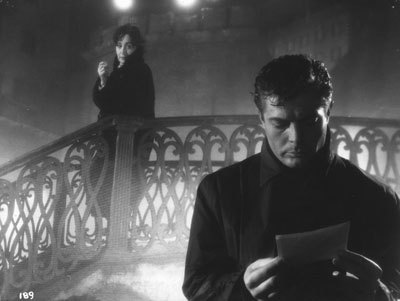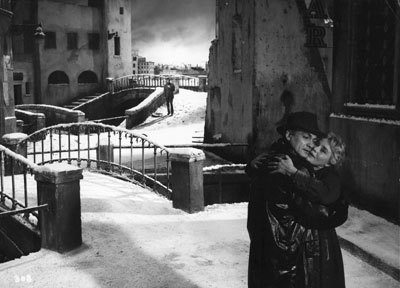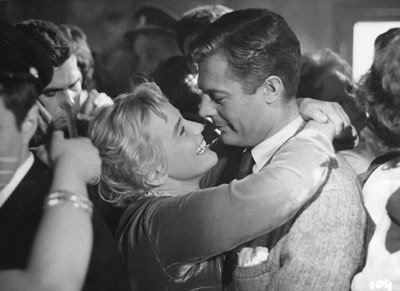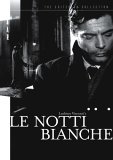| Reviews & Columns |
|
Reviews DVD TV on DVD Blu-ray 4K UHD International DVDs In Theaters Reviews by Studio Video Games Features Collector Series DVDs Easter Egg Database Interviews DVD Talk Radio Feature Articles Columns Anime Talk DVD Savant Horror DVDs The M.O.D. Squad Art House HD Talk Silent DVD
|
DVD Talk Forum |
|
|
| Resources |
|
DVD Price Search Customer Service #'s RCE Info Links |
|
Columns
|
|
|
Le Notti Bianche - Criterion Collection
Perhaps the true father of Italian Neorealism Lucino Visconti (1906-1976) has long been considered one of the most visionary directors in the history of Italian cinema. A director with an astonishing sense of composition and a camera that never seized to impress both the critics and public Visconti created some truly unforgettable films- Ossessione (1943), La Terra Trema (1948), Senso (1954), Il Gattopardo (1963), Morte e Venezia (1971), L'Innocente (1976).
After Mussolini and his fascist regime took over Italy Visconti moved to Paris where he met a friend and a true inspiration for his future films, Jean Renoir. Their friendship changed not only the way he looked at filmmaking but heavily influenced his political beliefs as well. As a result Visconti became a passionate Marxist and until his death in 1976 he remained vocal on Italy's often controversial political scene.

Le Notti Bianche a.k.a. White Nights (1957) was inspired by Dostoyevsky's short novel and tells the story of a lonely man falling in love with an equally lonely girl. The main protagonists Mario (Marcello Mastroianni) and Natalia (Maria Schell) meet by an accident and embark on a series of rendezvous' that will test their passion for life and commitment to pursue "true love". While their affection for each other is gradually bringing them closer their desire will ultimately prove to be a painful illusion.
Watching La Notti Bianche it almost feels as if Visconti meant for it to be a theater play. The scenery, the acting, the minimalist style of film composition all suggest that the great Italian maestro was searching for a rather intimate look. Mario and Natalia are often left on the screen struggling with their emotions and the story, which in fact is painfully familiar, is rather secondary. What appears more important in La Notti Bianche is the manner in which the narrative is composed and the expressive approach in which the film is shot.

La Notte Bianche is a very different film that somehow does not fit the style of Visconti's lavish pictures such as Il Gatoppardo for example. The acting also seems rather unusual. Marcello Mastroianni's character is weak, unsure of his ability to win over Natalia's heart, and above all incapable of changing the course of what seems from the very beginning a doomed affair. Regardless, there is a strange dose of realism in this film which ought to be considered especially given the fact that Le Notti Bianche was shot at time when Italy was under the heavy influence of political ideologies relying on utopian platforms.
One of the most stunning sequences in Le Notte Bianche is the raucous, filled with sexual innuendo, dance scene. In a total contrast with the overall mood of the film the dance performances by Mario and Natalia inevitably bring comparisons with the party scene from Fellini's La Dolce Vita. It almost feels for a moment as if the subversive nature of Fellini's notorious work has been able to sneak in Le Notti Bianche and alter the course of the film. The tremendous contrast which this specific scene brings to the otherwise utterly dramatic feel of the film is astonishing.
The mystical location of the film, a city that is meant to evoke Dostoyevsky's St. Petersburg, also adds up to the enormous beauty of Le Notti Bianche. From the opening shots where Mario strolls on the bridge wrapped in his heavy coat to the final moments when the snow begins to fall while Mario and Natalia are in a boat nearby the place where they first met Visonti's camera is indeed extraordinary. The film however never fully develops into a melodramatic romantic story that loses ground with reality. Even when Visconti enthralls the viewer with the beauty of the impossible love between Mario and Natalia there are moments reminding us that the main characters are real- Mario suffering a cold in his bed; the desperate attempt of a local prostitute to trick Mario under the bridge; Mario's painful realization that Natalia has committed herself to another man.

It is hard to tell what inspired Visconti to create Le Notti Bianche. Was it his active involvement as a theater director which during the same year Le Notti Bianche was shot led to his notorious collaboration at La Scala with the famous soprano Maria Callas? Or, was it Visconti's desire to give back to theater thus creating a minimalist film that showed a much more intimate side of the director's talent. Suffice to say whatever his motives might have been Le Notti Bianche remains one of the most truly poetic films from the Italian Neorealism unmatched in both beauty and style.
How Does the Film Look? How Does the Film Sound? Extras: -An interview providing interesting insights on the political atmosphere of the early 1950s as well as Visconti's style of composition. The interviewees include screenwriter Suso Cecchi D'Amico, cinematographer Giuseppe Rotunno, film critics Laura Delli Colli and Lino Micciche, costume designer Piero Tosi. The entire interview is offered with English subtitles. -A few screen tests that offer some raw material involving Marcello Mastroianni and Maria Schell. All of the footage appears silent but nevertheless provides an interesting look at the filming process of Le Notti Bianche. -Theatrical trailer- a typically long, original, Itaian trailer with English subtitles. -A recording of Dostoyevsky's White Nights narrated by actor T. Ryder Smith. An interesting approach to Dostoyevsky's work that brings a whole new look to the adaptation of Le Notti Bianche. 114 min. Final Thoughts:
,
|
| Popular Reviews |
| Sponsored Links |
|
|
| Sponsored Links |
|
|
| Release List | Reviews | Shop | Newsletter | Forum | DVD Giveaways | Blu-Ray | Advertise |
|
Copyright 2024 DVDTalk.com All Rights Reserved. Legal Info, Privacy Policy, Terms of Use,
Manage Preferences,
Your Privacy Choices | |||||||












